Oral and Maxillofacial Surgery Residency Program
About the Program
UTHSC College of Dentistry offers a formal four-year Advanced Oral and Maxillofacial Surgery training program (an optional six-year program leading to an MD degree is available in specific cases) which is officially affiliated with the Memphis VA Medical Center and Regional One Health. Le Bonheur Children’s Medical Center, Baptist Memorial Hospital-Memphis, and Methodist University Hospital provide the other primary sites of activity for the program.
The four-year program is academically divided into eight six-month terms. The Commission on Dental Education of the American Dental Association authorizes acceptance of two trainees each year. The National Resident Match Program is utilized in the selection of residents.
- PGY-1 7 months OMS, 3 months anesthesia, 2 months internal medicine
- PGY-2 6 months OMS, 1 month anesthesia, 1 month pediatric anesthesia, 3 months general gurgery, 1 month research
- PGY-3 7 months OMS, 1 month general surgery, 1 month research, 3 months ENT/plastics/oculoplastics
- PGY-4 12 months OMS as Chief Resident
The trainee’s clinical involvement is progressive from simple to complex surgical procedures. The first year is more heavily didactic with rotations on the medicine service to develop proficiency in physical diagnosis and patient evaluation. Five months of the second/third years are devoted entirely to general anesthesia. The remainder of the second year has increased responsibilities focusing on advanced dentoalveolar and impaction surgery and complicated trauma. Clinical applications in these areas continue in the third year with added emphasis on orthognathic surgery, implantology, and facial cosmetic surgery. Managing the administrative needs of the OMS service and a significant caseload comprise the responsibilities of the trainee's chief year.
Mission, History and Affiliations
The overall purpose of the Oral and Maxillofacial Surgery residency training program at the University of Tennessee, Health Science Center College of Dentistry is to educate and train residents in the specialty of oral and maxillofacial surgery. It is the goal of the department that all residents finishing the program be fully capable of becoming certified by the American Board of Oral and Maxillofacial Surgery.
This goal is achieved by providing an academic and clinical experience that addresses the curriculum requirements set forth in the accreditation standards for oral and maxillofacial surgery specialty education. The program is devoted to developing a well-trained specialist with cares and concerns for the total health of the patient and an appreciation for the social, civic, and moral responsibilities of the health care professional.
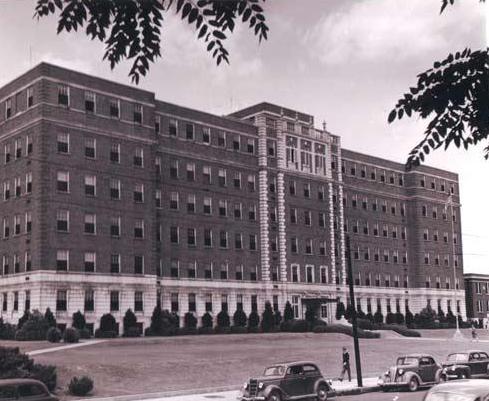
Established in Nashville, Tennessee in 1878 and relocated to Memphis in 1913, the University of Tennessee School of Dentistry is the 3rd oldest public college of dentistry in the United States and the oldest continuously operating dental school in the South.
The oral surgery residency program at UT found its beginnings in the 1940’s under the guidance of Dr. John Jones Ogden. Dr. Ogden graduated from UT dental school in 1916 and later, after serving in the U.S. Army Dental Corps during World War I, became the first dentist in Tennessee to limit his practice to oral surgery. Dr. Ogden served intermittently as a professor of surgery at UT and is recognized today as the first oral surgery residency program director at the University of Tennessee. Dr. Ogden was a fellow of the American Society of Oral Surgeons, a Vice President of the American Dental Association, and in 1932 served as President of the Tennessee State Dental Association. He is also well known as the designer of the parallel forceps used in the extraction of anterior teeth.

Dr. Julius Roy Bourgoyne served as the chairman of the UT oral surgery department from 1948 until 1959. He received his dental degree from Loyola University in 1941 and later completed an oral surgery residency program at Charity Hospital in New Orleans, Louisiana. Dr. Bourgoyne brought his hospital based training with him to Tennessee and transformed the surgery curriculum at UT from little more than an advanced exodontia program to a comprehensive hospital based residency. Under his direction, the program was lengthened in 1954 from 2 to 3 years and standardized to include anesthesia, exodontia, pathology, trauma, medicine, and general surgery training. Hospital operating room privileges were first granted to the UT oral surgery program by John Gaston Hospital with Baptist and Methodist hospitals soon following suit. These developments opened the doors for the oral surgery program to practice and perform true oral and maxillofacial surgery as we know it today. The oral surgery residency program advances that took place under Dr. Bourgoyne led to board eligibility in 1961.
It was in this same year, 1961, that Dr. Lloyd C. Templeton stepped in as chairman of the oral surgery department and program director of the oral surgery residency program. During his tenure, Dr. Templeton continued to advance the specialty of oral surgery and added a second resident position to the program. Dr. Templeton held the position of director until 1965 and that of chairman until 1966.

Dr. Joe Hall Morris became director of the oral and maxillofacial surgery program in 1965 and chairman of the oral surgery department in 1966. Dr. Morris graduated from the University of Tennessee, College of Dentistry in 1945 and received his training in oral and maxillofacial surgery at the University of Tennessee. He then went on to serve as an oral surgeon in the U.S. Army at Fort Benning, Georgia from 1951 to 1953. Throughout his career Dr. Morris contributed immensely as an inventor and contributor to the biomechanical aspects of oral and maxillofacial surgery. He is best known for his development of the Bi-Phase External Fixation Splint and the Orthognathic Surgery Simulating Instrument (OSSI). These two contributions have been well represented in the literature and have had a significant impact on both the fields of maxillofacial trauma and orthognathics.
In 1977 Dr. Morris oversaw the physical transition of the oral surgery program to its current home within the Winfield Dunn College of Dentistry. Additionally, in 1983 the Regional Medical Center at Memphis opened along with the Elvis Presley Memorial Trauma Center. These new facilities brought with them additional opportunities for surgical experience, so much so, that additional resident positions had to be added to keep pace with the surgical work loads. Dr. Morris continued as the department chairman until 1988 when Dr. Jim E. Albright accepted the position.
Dr. Albright completed his dental school training at the University of Tennessee in 1963. Upon completion of his dental training Dr. Albright accepted a commission as a dental officer in the U.S. Navy and completed his oral and maxillofacial surgery training at Bethesda Naval Hospital in 1973. He served on active duty until 1974 and as a reserve officer until his retirement at the rank of Captain in 1990. Dr Albright then served as the director of the oral surgery residency program from 1978 to 1988, at which time he accepted the position of department chairman. In his first year as chairman, Dr Albright added a fourth year to the oral surgery residency program bringing the total number of resident positions to its current tally of eight. In 1997, after 19 years as program director and 10 years as department chairman, Dr. Albright stepped down and turned the department chair over to Dr. Ben R. Hipp who served as the oral surgery department chairman until 2001.
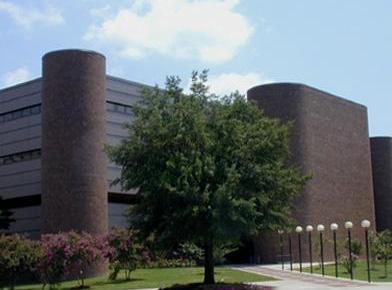
Today, the University of Tennessee Oral and Maxillofacial Surgery department is chaired by Dr. Lawrence Weeda. Dr. Weeda received his D.D.S. from the University of Missouri at Kansas City in 1974 and, like several of his predecessors, went on to accept a commission in the U.S. military. In 1984, he completed his oral and maxillofacial surgery training at Portsmouth Naval Hospital and continued to serve as a surgeon in the Navy until his retirement in 1988. As department chairman, Dr. Weeda has continued to develop and improve the training and education of both dental students and oral surgery residents alike. In 2003, an optional MD degree training track was approved for those graduating surgery residents interested in additional medical education and experience. Most recently, the department installed a state-of-the-art cone beam CT unit allowing for the use of three-dimensional computed tomography image reconstructions in CT guided implant and bone graft treatment planning and placement.
The University of Tennessee Oral and Maxillofacial Surgery department has always been on the forefront of innovation. From the historical invention of the parallel forceps to today’s use of three-dimensional computed tomography, the University of Tennessee has and will remain on the cutting edge of oral and maxillofacial surgery.
The University of Tennessee Oral and Maxillofacial Surgery program is officially affiliated with the Regional One Health, the Memphis Veterans Affairs Medical Center, Le Bonheur Children’s Hospital, and Methodist University.
Regional One Health
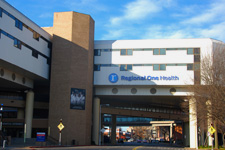 Regional One Health
Regional One Health
877 Jefferson Avenue
Memphis, TN 38103
(901) 545-7100
Regional One Health (ROH) was established in 1829, making it the oldest health system in Tennessee. In addition to being the home of the Elvis Presley Trauma Center, Regional One Health also includes several other Centers of Excellence in Burn, High-Risk Obstetrics, and Neonatal Intensive Care (NICU).
ROH is the largest medical and surgical teaching site for the University of Tennessee Health Science Center. More than half of Tennessee's doctors will receive some, if not all, training at ROH. The partnership between Regional One Health and the University of Tennessee Health Science Center includes the UT Regional One Physicians group, the largest teaching physician group of its kind in the Mid-South.
Le Bonheur Children's Hospital
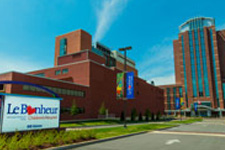 Le Bonheur Children's Hospital
Le Bonheur Children's Hospital
848 Adams Ave
Memphis, TN 38103
(901) 287-5437
Founded in 1952, Le Bonheur Children's Hospital is an integral part of the Methodist Healthcare Family and a training site for many University of Tennessee Health Science Center residencies/fellowships. A new $340-million hospital building was built in December 2010 to accommodate the over 100,000 patients seen each year.
Named one of the nation's "Best Children's Hospitals" by U.S. News & World Report, Le Bonheur is the only Level 1 pediatric trauma center in the Mid-South. Its neonatal intensive care unit (NICU) provides the highest level of care for the region's critically ill newborns.
Methodist University Hospital
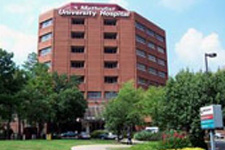 Methodist University Hospital
Methodist University Hospital
1265 Union Avenue
Memphis, TN 38104
(901) 516-7000
Methodist University Hospital (MUH) is a partnership of two healthcare leaders, Methodist Healthcare and the University of Tennessee Health Science Center (UTHSC). Located in the medical center and formerly known as Methodist Central, MUH is a 617-bed facility and the principal adult private teaching hospital for UTHSC. Methodist University Hospital provides real-world experiences of managing medical problems in an efficient and effective institution.
MUH and UTHSC bring together research, medicine, and innovation. This partnership supports multidisciplinary collaboration among doctors and clinical team members, leading to more advanced medical care for patients.
Baptist Memorial Hospital - Memphis
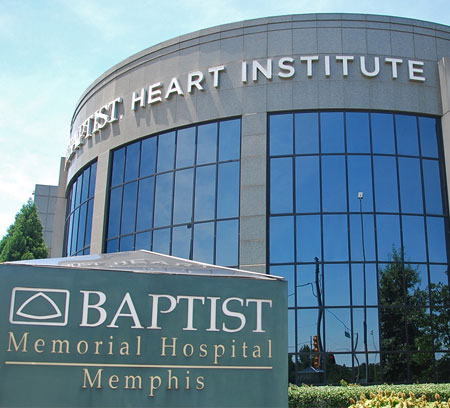 Baptist Memorial Hospital
Baptist Memorial Hospital
6019 Walnut Grove Rd.
Memphis, TN 38120
(901) 226-5000
Baptist Memorial Hospital (BMH) is a 706-bed, full-service private hospital. The Memphis campus also houses the Restorative Care Hospital, the Baptist Memorial Hospital for Women, the Plaza Diagnostic Pavillion for outpatients, and the Baptist Heart Institute. A dedicated, five-room pediatric emergency room is located in the Spence and Becky Wilson Baptist Children's Hospital, which is part of the BMH for Women.
BMH is one of Tennessee's busiest hospitals with 55,000 emergency department visits and 12,000 surgeries a year. A variety of subspecialty and ambulatory electives are available taught by volunteer faculty, many of whom have received teaching awards.
2025-2026 Trainee Compensation Rates for ACGME-Accredited Programs
| PGY Level | Base Annual | with Disability and Life Benefits* |
|
PGY 1
|
62,304
|
62,964
|
|
PGY 2
|
64,764
|
65,424
|
|
PGY 3
|
66,900
|
67,560
|
|
PGY 4
|
69,624
|
70,284
|
|
PGY 5
|
72,600
|
73,260
|
|
PGY 6
|
75,504
|
76,164
|
|
PGY 7
|
78,528
|
79,188
|
*In addition to the base salary, those residents participating in the disability and group life insurance programs provided through GME currently receive an additional $660 per year for disability and life insurance benefits as shown above in Column 3. Residents not participating do not receive this stipend.
For more resident salary information, please see GME Policy #210.
Fringe benefits include:
- Lab Coats – 4 coats are provided by GME
- Computer Literature Searches and Photocopying
- Access to recreational facilities
- Use of Computer Education Resource Center
Library Resources
Residents and fellows have access to the UT Health Science Center Library. This includes catalog and database searches, e-books, e-journal finder, and study carrels. Please contact the library to get an access code for use with all on-line services of the library.
Insurance
Residents and fellows may obtain healthcare (health, dental, and vision), life, and
disability insurance. A detailed overview of insurance is available on the GME Insurance page.
University Health also offers a number of services to support employees, including housestaff.
See GME Policy #230 and #240 (Protection Against Liability) for more information.
Leave
Residents and fellows may take up to:
- three (3) weeks of annual leave per a twelve-month period
- three (3) weeks of sick leave per a twelve-month period
- up to 10 days per twelve-month period for educational leave (granted with the approval of the Program Director)
- up to 12 weeks FMLA and/or four months leave (paid or unpaid) for the birth or adoption of a child
- three (3) days of paid leave for the death of an immediate family member
See GME Policy #220 for specifics on leave.
GME Policies and Procedures
A full list of resident/fellow Policies and Procedures is available on the GME web site.
